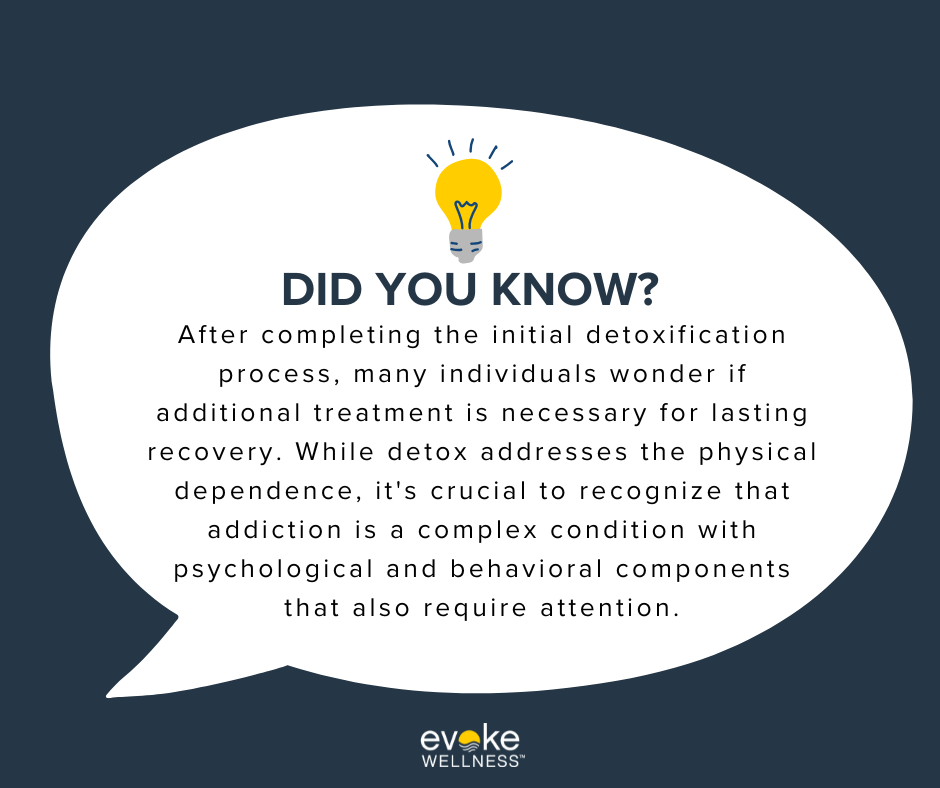Are you considering detox as a first step toward recovery from substance abuse? While detox is a crucial component, it’s often just the beginning of a comprehensive treatment journey. Understanding when you need more than detox can be the key to achieving lasting sobriety. Recent studies show that individuals who follow detox with additional treatment have significantly higher rates of long-term success. In fact, the National Institute on Drug Abuse reports that continuing care after detox can reduce relapse rates by up to 60%. This article will guide you through the signs indicating a need for further treatment, helping you make informed decisions about your recovery path and maximize your chances of sustained sobriety.
Together, let’s embrace the journey to recovery and the promise of a new beginning. Call us at (833) 949-1347 today or reach out online.
How do I know if I need more than Detox?

Evaluating the Severity
The severity of the substance use disorder plays a significant role in determining the need for further treatment. According to a study by the National Institute on Drug Abuse, individuals with severe or long-term addiction often require more comprehensive care beyond detox. Factors like the duration of substance abuse, the amount and frequency of use, and the presence of co-occurring mental health disorders can indicate a higher level of care is necessary.
Addressing Underlying Issues
Addiction is often a symptom of deeper underlying issues, such as trauma, mental health conditions, or environmental factors. A report by the Substance Abuse and Mental Health Services Administration (SAMHSA) highlights the importance of addressing co-occurring disorders, as they can exacerbate substance abuse and increase the risk of relapse if left untreated. Effective treatment should incorporate therapy and counseling to identify and work through these root causes.
Building a Strong Support System
Overcoming addiction requires more than just willpower; it demands a strong support system and the development of healthy coping mechanisms. Comprehensive treatment programs often include group therapy, family counseling, and aftercare planning to help individuals build a robust network and acquire the necessary skills to maintain sobriety in the long run.
Tailored Treatment Approach
Every individual’s journey with addiction is unique, and a one-size-fits-all approach is rarely effective. A study published in the Journal of Substance Abuse Treatment suggests that tailoring treatment to individual needs and preferences can significantly improve outcomes. Residential treatment programs, intensive outpatient programs, and medication-assisted therapies are among the options that may be recommended based on a thorough assessment.
Remember, seeking professional guidance from addiction specialists can help determine the most appropriate course of action beyond detox. With the right support and commitment, lasting recovery is achievable.
Signs that detox alone may not be enough
Ongoing Substance Cravings and Relapses
While detox helps rid the body of substances, it does not address the underlying psychological and behavioral aspects of addiction. Many individuals relapse even after completing detox due to intense cravings, triggers, and lack of coping mechanisms. This highlights the need for comprehensive treatment that combines detox with therapy, counseling, and relapse prevention strategies.
Unresolved Mental Health Issues
Substance abuse and mental health disorders like anxiety, depression, or trauma often co-occur. Detox alone cannot treat these co-occurring disorders, which require specialized dual diagnosis treatment. Neglecting mental health can increase the risk of relapse and hinder long-term recovery.
Lack of Support System
Recovery is a lifelong journey that requires a strong support network. Without a solid support system, individuals may struggle to maintain sobriety after detox. Comprehensive treatment programs provide access to support groups, counseling, and aftercare services to help navigate the challenges of early recovery.
Polysubstance Abuse or Complex Addictions
Some individuals may struggle with multiple substance addictions or a combination of substance abuse and behavioral addictions like gambling or sex addiction. Detox alone may not be sufficient to address the complexities of these co-occurring disorders, necessitating a more comprehensive and personalized approach to treatment.
Treatment options after detox
Inpatient Rehab Programs
Completing detox is just the beginning of the recovery journey. Many individuals require more intensive treatment to address the underlying causes of addiction and develop coping mechanisms for long-term sobriety. Inpatient or residential rehab programs offer 24/7 care in a structured, therapeutic environment, typically lasting 30-90 days.
This higher level of support helps increase success rates for long-term recovery (35-50%) compared to outpatient programs. Residential rehab incorporates various evidence-based therapies, such as cognitive-behavioral therapy (CBT), dialectical behavior therapy (DBT), and group counseling, to promote emotional regulation, healthy thinking patterns, and interpersonal skills essential for maintaining sobriety.
Outpatient Treatment
For those with less severe addictions or external responsibilities like work or family, outpatient programs provide more flexibility. Intensive outpatient programs (IOPs) offer several hours of treatment per day, multiple days per week, while allowing patients to live at home. Individual and group therapy sessions provide ongoing support and accountability.
Medication-assisted treatment (MAT) is another outpatient option, combining medications like buprenorphine or methadone with counseling to manage cravings and withdrawal symptoms during the recovery process.
Dual Diagnosis Treatment
For those struggling with co-occurring mental health conditions like depression, anxiety, or PTSD, dual diagnosis treatment programs integrate comprehensive care for both substance abuse and psychiatric disorders. This holistic approach acknowledges how these issues often intersect and fuel one another, requiring simultaneous treatment for the best outcomes.
Dual diagnosis centers in Ohio offer specialized therapy, medication management, and support groups tailored to the unique challenges of co-occurring disorders, improving long-term recovery prospects.
What is the next step after detox?
Continuing Treatment and Support
Completing a medically-supervised detox program is a crucial first step, but it’s only the beginning of the recovery journey. Detox helps individuals safely rid their bodies of substances, but comprehensive addiction treatment is essential to address the psychological and behavioral aspects of substance use disorders. The next phase involves transitioning into a rehabilitation program to develop the skills and support system necessary for lasting sobriety.
Treatment Program Options
After detox, individuals can choose from various evidence-based treatment options, including:
- Residential or inpatient programs providing 24/7 care and a highly structured environment to focus solely on recovery through therapy, counseling, and holistic activities.
- Intensive outpatient programs (IOPs) allowing more flexibility to live at home while receiving several hours of treatment per week.
- Medication-assisted treatment (MAT) using medications like buprenorphine or methadone alongside counseling to manage cravings and withdrawal.
Comprehensive, Personalized Care
The most effective treatment approach combines multiple evidence-based therapies tailored to each individual’s unique needs. This may include cognitive-behavioral therapy, family counseling, trauma-informed care, holistic practices like yoga and mindfulness, and relapse prevention planning. Quality programs like Evoke Wellness Ohio offer specialized tracks for different populations and create personalized treatment plans for a well-rounded recovery experience.
Continuum of Care
Recovery is an ongoing process that often requires different levels of care over time. After detox and initial rehabilitation, many individuals benefit from continued support through aftercare services like sober living, alumni programs, and outpatient counseling. This comprehensive continuum of care helps prevent relapse and promotes lasting lifestyle changes for improved physical, mental, and social well-being.
FAQ: How long should I be in treatment after detox?
The Importance of Continued Care
Completing detox is a significant first step towards recovery, but it should not be viewed as the end of the process. Detox alone is not sufficient for achieving long-term sobriety. According to research, longer treatment durations of 6 months or more are generally associated with better outcomes and reduced risk of relapse.
Tailoring Treatment Duration
The appropriate length of continued treatment after detox depends on various individual factors. These include the severity of the addiction, the presence of co-occurring mental health disorders, the strength of one’s support system, and progress in developing essential coping mechanisms.
Inpatient or residential programs typically last 30-90 days, providing an immersive, focused environment for intensive therapies and counseling. Many then transition to outpatient programs like IOPs (Intensive Outpatient Programs) or individual/group therapy sessions for continued accountability and skill-building.
A Holistic, Flexible Approach
At Evoke Wellness, our goal is to create personalized treatment plans that address each person’s unique needs and challenges. Our intensive inpatient program offers stays from 30 days up to 90 days, with the option to extend further based on one’s progress and circumstances.
We emphasize a holistic approach, combining evidence-based therapies like dialectical behavior therapy (DBT) with activities that promote physical, emotional, and spiritual wellness. This comprehensive care helps patients develop the skills and resilience needed for lasting recovery.
Commitment to Long-Term Success
Overcoming addiction is an ongoing journey that requires patience, hard work, and a strong support system. At Evoke Wellness, we understand that recovery doesn’t end when inpatient treatment concludes. Our robust aftercare programs, such as sober living environments and alumni services, provide the continued guidance and community vital for maintaining sobriety. We’re committed to helping our patients achieve lifelong wellness, every step of the way.
Conclusion
In conclusion, determining whether you need more than detox is a critical step in your recovery journey. While detox is an essential first phase, it’s often just the beginning. Recent studies show that individuals who follow detox with comprehensive treatment have significantly higher rates of long-term sobriety. By honestly assessing your needs and seeking professional guidance, you can make an informed decision about your treatment path. Your commitment to recovery extends beyond detox, and with the right support and resources, you can achieve lasting sobriety and improved overall well-being.
Begin Your Journey with Evoke Wellness at Hilliard
If you or a loved one is considering treatment, Evoke Wellness at Hilliard invites you to contact us. Our compassionate team is ready to answer your questions, discuss your needs, and help you take the first steps toward recovery. In Hilliard, you’ll find more than just a treatment program – you’ll discover a community dedicated to your wellness and success. Together, let’s embrace the journey to recovery and the promise of a new beginning. Call us at (833) 949-1347 today or reach out online.



